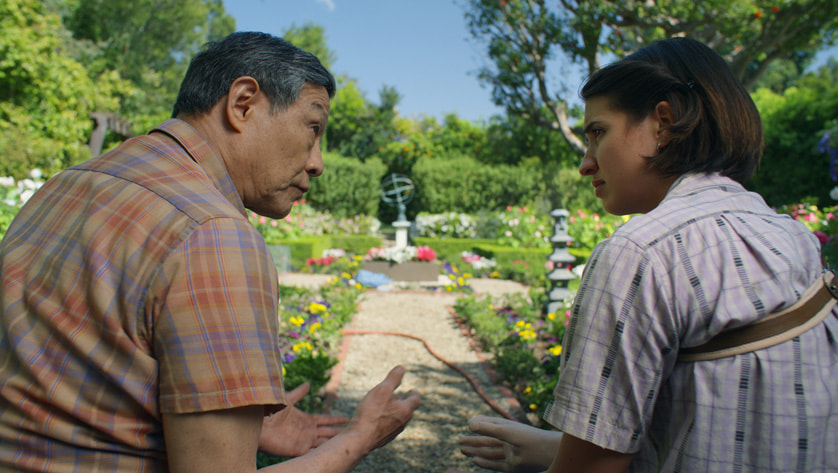Given all the money that Apple TV+ pours into their programs—big-budget, prestige dramas with A-list casts and dreams of Emmy glory, like “Severance,” “The Morning Show,” and “The Mosquito Coast”—it’s easy for scrappy little anthology shows like “Little America” to fall by the wayside. And yet, in its unassuming nature and casual confidence, not to mention the heartwarming humanism of its stories, it might be one of the streamer’s greatest secret weapons.
Akin to its (excellent) first season, “Little America”’s second turn at bat features another batch of eight half-hour stories drawn from the pages of Epic Magazine’s column of the same name. “Inspired by a true story” of immigrants living in America, as the title sequence always reminds us (the exact phrase appears below the English text, translated into the subject’s native language), creators Lee Eisenberg, Kumail Nanjiani and Emily V. Gordon plop us in the shoes of a different topic each episode. The only commonality is that our protagonist has come to the US from somewhere else: apart from that, the canvas is wide open, with the creators playing with time, tone, and genre in ways as diverse as their subjects.
Of course, the usual threads weave their way through the prototypical story of the immigrant experience, many of which rear their heads in these episodes. The culture clash between parent and child runs throughout: Season opener “Mr. Song” guides us through the tale of Korean-American Luke Song (Ki Hong Lee), who strains against his parents’ desire for him to go to medical school and his yearning to be an artist. (Spoiler alert; he’d end up taking over his mother’s hat shop in Detroit and eventually designing Aretha Franklin’s hat for President Obama’s inauguration.)

The best, most formally ambitious take on this tension this season is “The 9th Caller,” which structures itself around a weekend-long kiss-a-car contest that Sri Lankan-American Sachini (Isuri Wijesundara) participates in. She’s dropped out of college and disappointed her stern father (the always-lovely Bernard White), and subconsciously sees this absurd competition as a way to impress him. Flashbacks (and even a cheeky Bollywood musical sequence set to Sixpence None the Richer’s “Kiss Me”) highlight the ways these intergenerational anxieties can ripple through from past to present.
Granted, the show never gets too heavy in its tone, or ambitious with its form: The anthology as a whole operates within a kind of heartwarming familiarity that makes the episodes go down easy. (It feels apt that “CODA” director Siân Heder is an executive producer; the episodes carry the warm-and-fuzzy vibe of a Sundance dramedy.) But that accessibility feels purposeful, aimed toward the show’s mission of demonstrating the resilience and joy that’s possible in the American experience. Episodes like “The Space Door” and “Columbus Starlings LLC” (my favorite) end on dizzying highs, its characters having cracked the code to unlocking their happiness; it’s downright infectious, and it’s hard not to crack a smile when the episodes end with follow-up text and pictures showing how well their inspirations are doing now.
It’s not all rainbows and shining cities on a hill, though: “Little America” is also acutely aware of the country’s failings, and the challenges both big and small immigrant life can present. “The Bra Whisperer” follows an immigrant from Belize (Stacy Rose’s Ines) who’s built her own successful bra business—but flashbacks highlight what it cost to get her to that level, including missing her young daughter’s childhood and working as a nanny for an Orthodox Jewish woman who’ll never consider her part of the family. “Camel On a Stick”’s lead is a Somalian restaurateur (Hanad Abdi) stuck in a pressure cooker of impressing finicky white audiences with spicy Somalian food and representing his broader community. (“Captain Phillips”’ Barkhad Abdi shows up in a supporting role, which is nice to see.)

White America’s paternalistic side comes out most acutely in “The Indoor Arm,” as a pair of Nicaraguan sisters (Victoria Canal and Teresa Ruiz) find themselves in the employ of a nice-seeming older woman (June Squibb) whose benevolence is complicated by her family friendship with the Reagans—the very people responsible for their ousting given Iran-Contra.
Each of these stories paints a complex picture of the perseverance and endurance of American immigrants and the ways in which they add to the vast tapestry of the country they’ve chosen to call home. Like season one, all eight stories are narratively disconnected but watch them all together, and their cumulative effect hits with tremendous impact. It may not make as big a splash as “For All Mankind” or “Ted Lasso,” but “Little America” feels most attuned to the tiny victories and relatable crusades of the everyday American, no matter where they come from. It’s a small show, but it punches well above its weight class.
Whole season screened for review. On Apple TV+ now.












